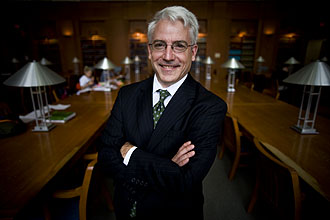New Law Dean Addresses Korean Legislators
David Meyer, the newly installed dean of Tulane Law School, scarcely had time to move into his office before hopping on a plane to deliver an address at the Korean National Assembly. Meyer, whose tenure as dean officially began on July 1, presented a paper, “Constitutional Change in the American Experience,” at a televised conference sponsored by South Korea's legislative body on July 16 as part of that country's observance of the 62nd anniversary of its constitution.

The ability of the law to rationally resolve “competing visions of society” is a beautiful thing, says David Meyer, new dean of Tulane Law School. (Photo by Paula Burch-Celentano)
“There is a lively debate in Korea over whether the constitution there should be revised in a substantial way through the amendment process,” says Meyer, a scholar of both constitutional and family law.
One of three foreign scholars invited to speak to the Korean National Assembly, Meyer noted in his address his own country's challenges in making constitutional changes.
“I pointed out that in the United States, formal amendment of the constitution is so extraordinarily difficult that the great bulk of constitutional change happens by means of interpretation and sometimes through dramatic shifts in interpretive understanding of text rather than through formal amendment.”
It is just that vitality in law that can be so daunting to new law students, says Meyer. “They think they have something firm to hold onto, and then they discover that it is much more fluid and indeterminate and the product of ongoing negotiation by players in the legal system.”
Meyer, whose early memories growing up in Tallahassee, Fla., contain vivid recollections of the Civil Rights movement, says he was first inspired by the way law figured so prominently in people's lives.
“Law offers a means through which members of a society seek to order their basic affairs and relationships and try to rationally resolve competing visions of society.”
Before coming to Tulane, Meyer was associate dean of academic affairs at the University of Illinois College of Law. Joining him as an associate professor at the law school is his wife, Amy Gajda, a specialist in First Amendment law and privacy issues.
